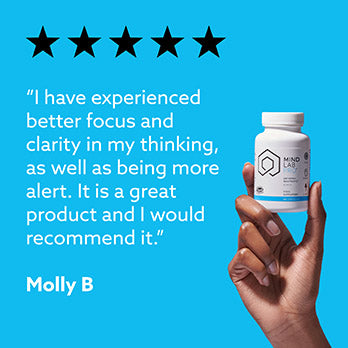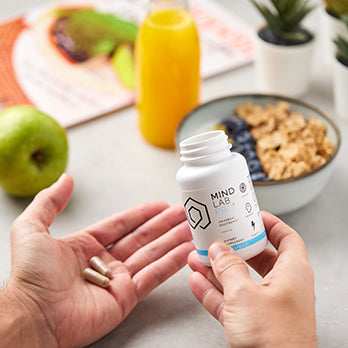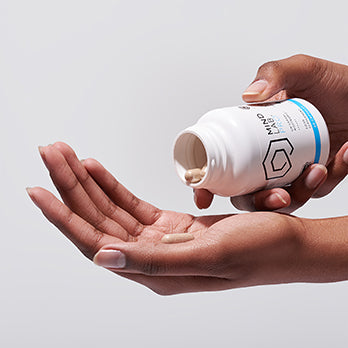We need sleep to recover and recharge our brains after a long, hard day's work. However, achieving sufficient sleep every night comes with a paradox problem: every hour spent on nighttime sleep recovery is an hour spent unconscious and unremembered. Sure, you might have the occasional vivid dream, but those often elude memory by the time we're fully conscious.
Wouldn't it be great to maintain consciousness in our dreams, to explore the Dionysian looseness of our minds that remains otherwise untapped during waking hours? A lucid dream is exactly that: an REM dream event in which the dreamer remains conscious and self-aware, engaging the dream as an active participant.
For creative thinkers and writers, reliably engaging lucid dreams is a legitimate practice with the practical reward of unlocking the abstract genius buried by daytime logic and reason. Yet, it's an unreliable, elusive practice that requires a substantial amount of planning and luck to pull off. Fortunately, nootropics for lucid dreaming may help liken the odds of a lucid dream occurrence.
In this guide, we'll cover the best techniques on how to achieve a lucid dream as well as the best nootropics for the job.
Key Takeaways
- Supplements that supply choline may help with dream recall, making it easier for individuals to remember and analyze their dreams upon waking, which is essential for lucid dreaming practices.
- Certain supplements help intensify the clarity and vividness of dreams, which can enhance the overall lucid dreaming experience and make it easier to recognize when you are dreaming.
- Supplements like magnesium and L-theanine can promote deeper, more restful sleep, which is crucial for the REM sleep phase where vivid dreams and lucid dreaming occur most frequently.
- Nootropics such as bacopa monnieri and lion’s mane support cognition, helping to maintain mental clarity and possibly increasing the likelihood of becoming aware of being in a dream state.
- Nootropics that boost focus and attention, like Rhodiola Rosea, can help individuals sharpen awareness during waking hours and within dreams, facilitating the transition to lucid dreaming.
Best Lucid Dreaming Supplements to Buy in 2025
Mind Lab Pro® (MLP®): This "Universal Nootropic" supplies 11 nootropics, including several of the best for lucid dreaming specifically. It's an all-round brain booster that helps activate parts of the brain that support awareness, clarity and more. Buy MLP Now®
Performance Lab Sleep®: An ultramodern sleep supplement, Performance Lab Sleep supplies natural melatonin from tart cherry plus L-Theanine and more to help you enter deep sleep stages for memorable dreams. Learn about the Best Sleep Supplements in 2025
What is a Lucid Dream?

Lucid dreaming is exactly as it sounds: a dream in which the dreamer is lucid. More specifically, a lucid dream places the dreamer in a hybrid state between consciousness and unconsciousness, straddling the line between waking (WEC) and non-lucid (REM) dreaming.
When we sleep, we cycle between REM (rapid eye movement) and non-REM sleep, and it's during REM that we typically dream. Identified by the rapid fluttering of the eyes, REM stages of sleeping only occur in brief spurts, as indicated below:
On an EEG scan, a lucid dream event constitutes "a hybrid state of consciousness with definable and measurable differences from waking and from REM sleep, particularly in frontal areas
Lucid dreams occur when high and low brainwave frequencies are simultaneously engaged, with the high "waking" frequencies predominantly concentrated in the frontal brain regions that we associate with working memory. As a subset to short-term memory, working memory is task-related function of learning that's temporarily concerned with immediate perceptual and linguistic processing. An example of working memory includes memorizing a phone number long enough to enter it into your phone.
A better working memory capacity may remember a more elaborate number for a greater time period.
Likewise, an enhanced working memory may achieve greater perceptual awareness during these hybrid lucid dream states.
Yet, as the hypnogram suggests, the chances of inducing a lucid dream during an REM cycle are varied and somewhat unreliable. For the sleep hackers who are totally committed to lucid dreaming, the practice requires a substantial degree of timing and discipline.
So, why go through all that trouble, if lucid dreaming isn't a for sure thing?
The Advantages and Disadvantages of Lucid Dreaming
Not everyone cares for lucid dreaming, nor should everyone seek lucid dreams. For the most part, lucid dreaming appeals to creative types who listen to their dreams for inspiration. Neuroscientists find interest in dreams for what they might reveal to us about our brain-states in relation to cognitive phenomena, whereas psychoanalysts view dreams as windows into our unconscious desires, fears, thoughts, and motivations.
Today's artists synthesize both viewpoints in their approach to lucid dreams, pinpointing the most neurochemically successful track to lucid dreams so that they might reveal the secrets to their creative self-expression. Ideally, a successful lucid dream event allows the dreamer to view his/her unconsciousness fears and frustrations in an emotionally detached, objective mindset.
In other words, lucid dreaming may operate as a sort of self-induced therapy session, allowing the dreamer an outside perspective on his/her inner problems.
However, lucid dreaming as a form of therapy might backfire under certain conditions of psychosis. As the study "Psychosis and the Control of Lucid Dreaming" suggests, while lucid dreams may enact psychological strengthening in non-psychotic dreams, "a psychotic population LD practice may further empower deliria and hallucinations, giving internal reality the appearance of external reality."
Even so, for the average, healthy dream seeker, the requirement of an enhanced working memory capacity is in itself a worthwhile ambition. And if the dreamer achieves lucidity, the psychological value of lucid dreaming may grant the priceless reward of self-realization.
We don't create dreams, we catch them.
How to Lucid Dream
Lucid dreaming requires a strong working memory. Again, working memory helps us process task-related information, from remembering a phone number to solving a math problem to visualizing an image you'd like to paint. Within the dream space, working memory engages our critical thinking in a way that heightens our dream-state self-awareness.
Clinical psychologists and lucid dream enthusiasts believe our capacity for self-awareness may be improved by practicing the following:
Keeping a Dream Journal
For general creativity and problem solving, writing in a dream journal may not only help document elusive creative sleep-thoughts but improve dream recall. To pull off a successful dream journal, the dreamer must record everything he/she can remember from the dream upon first waking. This may improve dream recall, thereby improving dreamers' likelihoods of identifying patterns in their dreams.
Mnemonic Induction of Lucid Dreams (MILD)
While various approaches (each with their respective acronym) have been studied for inducing lucid dreams, the Mnemonic Induction of Lucid Dreams (MILD) seems particularly promising. The MILD approach involves the following steps:
- Set an alarm to go off five hours after you start sleeping.
- When you wake, try to remember any dream you had; if you can't remember that night's dream, try recalling any dream.
- Mentally repeat the phrase: "Next time I'm dreaming, I'll remember I'm dreaming."
- Visualize yourself in the dream you recalled from step 2.
- Repeat steps 3 and 4 until you fall asleep.
The MILD technique corresponds with the Wake-Back-to-Bed method (i.e., timing an alarm to wake you during peak REM then falling back to sleep) that's anecdotally favored by lucid dream enthusiasts.
Deep Meditation
Similar to the EEG findings associated with lucid dreaming, meditation may calm the mind into a hybrid high-and-low brainwave state. Practiced meditators achieve intense, yet calm, introspection by lulling their brain to near-sleep brainwave frequencies while still maintaining high "conscious" frequencies to observe their thoughts. Practicing pre-sleep meditation may strengthen the hybrid brain frequency capacity associated with lucid dreaming.
Benefits of Lucid Dreaming Nootropics
Is it possible to achieve lucid dreaming with nootropics? While the above strategies may help release the psychological barriers preventing successful lucid dream events, nootropics may benefit those strategies by promoting the neurotransmitters and brainwave frequencies associated with lucid dreaming. The two key brain chemicals linked to lucid dreaming are:
- Acetylcholine (ACh) - enhanced ACh activity seems to improve working memory and dream vividness.
- Serotonin - the serotonergic pathway plays a key role in sleep quality and REM cycles.
Improving brain chemical not only improves sleep quality and lucidity but may also enhance daytime mental performance. Likewise, nootropics that promote certain brainwave frequencies associated with calm, meditative sleep may also help reduce daytime anxiety and stress. Not to mention that any nootropic that benefits sleep quality also improves brain health and brainpower across the board on virtually every measure of cognitive performance.
Best Nootropics for Lucid Dreaming
Bacopa Monnieri

Powerful Ayurvedic adaptogen with key cholinergic benefits, including acetylcholinesterase inhibition and choline acetyltransferase activation.
One of the best starting places for crafting a lucid dream stack is to find a safe nootropic that enhances or mimics acetylcholine activity. Bacopa monnieri, a legendary herb with immense neuroprotective potential, seems to improve acetylcholine activity by:
- Inhibiting acetylcholinesterase - an enzyme responsible for breaking down acetylcholine within the neuron synapse (cell-to-cell transmissions).
- Activating choline acetyltransferase - an enzyme required for acetylcholine synthesis via the transfer of an acetyl group from the coenzyme acetyl-CoA.
Lucid dreaming supplements tend to favor acetylcholinesterase inhibitors for their pronounced effects on dream vividness. However, certain popular acetylcholinesterase inhibitors come with negative side effects, namely GI discomfort.
Bacopa monnieri, on the other hand, is a safe, well-tolerated herb with plenty of clinical research to back it up. Often taken by students, Bacopa's boost on memory and learning make it particularly beneficial for task-related functions. During the daytime, this benefit may manifest in the ability to multitask and manage several ideas and tasks at once. For the lucid dreamer, this is key for enhancing dream awareness and visualization.
To get the most out of your Bacopa supplement, look for a standardized full spectrum extract. This herb may require a couple weeks of daily supplementation to reach peak effect, so a little patience may be required.
More on Mind Lab Pro® Bacopa Monnieri.
B Vitamins

B vitamins, namely B6, may improve dream vividness and recall, as well as sleep quality.
As co-factors in various metabolic pathways, B vitamins play a key role in neurotransmitter syntheses, namely within the catecholaminergic (e.g., dopamine) and serotonergic pathways. Their improvements on mood-related brain chemicals make B vitamins one of the go-to nootropics for emotional balance. However, one preliminary study suggests vitamin B6 may also play a role in dream vividness:
- In a small, placebo-controlled study, vitamin B6 was administered to college students for a period of five consecutive days, during which changes in dream vividness and recall were observed. The researchers found that B6 "may act by increasing cortical arousal during periods of rapid eye movement (REM) sleep."
Vitamin B6's potential role in dream vividness may be linked to the vitamin's involvement in the conversion of tryptophan to serotonin. A follow-up study observed an increase in "the amount of dream content participants recalled" (i.e., dream recall).
It's also worth noting that B vitamin deficiency, namely B6-deficiency, has been linked to distress-related sleep disturbances, perhaps due to B vitamins' role in mood-related brain chemical balance.(7) Generally speaking, both daytime and nighttime cognition tends to decline under conditions of B vitamin deficiency. As we age, the need for a quality B vitamin supplement only increases.
More on Mind Lab Pro® Vitamin B6.
More on Mind Lab Pro® Vitamin B9.
More on Mind Lab Pro® Vitamin B12.
L-Theanine

By promoting alpha brainwaves, L-theanine sustains a relaxed, meditative mindset even in the face of stimulation.
In our caffeinated society, overstimulation has an increasingly negative impact on our cognitive performance and sleep quality. This is why many nootropic enthusiasts pair their caffeine sources (namely coffee) with L-Theanine, the relaxing amino sourced from Camellia sinensis green tea leaves.
Unlike other relaxing compounds, L-theanine delivers its calming effects without also sedating the mind to the point of cognitive impairment. It's a unique nootropic amino that may supplement for both focus enhancement and mental relaxation. And this amino delivers these results by promoting alpha brainwaves, the brain frequencies often associated with calm, meditative thinking.
Traditionally, drinking tea demonstrated improvements in sleep quality and stress reduction, yet an increase in caffeine content correlated with a decrease in those benefits. By isolating L-theanine as a standalone nootropic, those sleep quality and mood benefits may translate better to improved sleep and relaxation. For sleep disorders associated with hyperactivity, the Suntheanine® brand, in particular, seems beneficial in improving objective sleep quality.
If falling asleep is the primary barrier between you and lucid dreaming, L-theanine is the perfect, non-groggy option.
More on Mind Lab Pro® L-Theanine.
Citicoline (CDP Choline)

Citicoline supplies cytidine and raw choline precursor for acetylcholine synthesis.
Bacopa monnieri may assist lucid dreaming by amplifying acetylcholine activity. However, without sufficient acetylcholine levels, there isn't much for Bacopa to amplify. Citicoline solves this by supplying raw choline building block material for acetylcholine synthesis. Altogether, citicoline is comprised of:
- Choline - the precursor to phosphatidylcholine and neurotransmitter acetylcholine.
- Cytidine - the precursor to nucleotide uridine, an energizing nootropic that may enhance synaptic plasticity and neuronal repair.
This one-two mix of a cholinergic and brain energy booster makes citicoline a powerhouse nootropic, great for cognitive enhancement and maintenance.<9> Paired with a full night's rest, citicoline's brain boosts may help increase the brain's regenerative capacity while also enhancing acetylcholine levels for increased dream vividness.
Compared to other nootropic choline sources, citicoline outperforms the rest by supplying a choline that's not only capable of crossing the blood-brain barrier (unlike standard choline bitartrate) but is paired with brain energizing cytidine. The Cognizin® brand of citicoline is also safe and well-tolerated.
More on Mind Lab Pro® Citicoline.
Best Lucid Dreaming Supplements for 2025
Mind Lab Pro®

MLP® mixes a smart, diverse stack of nootropics that concurrently amplify daytime cognitive performance and nighttime dream vividness.
By committing to a stimulant-free formula design, Mind Lab Pro® boosts energized daytime thinking without compromising sleep quality. On the contrary, this formula's unique synergy approach to cognitive enhancement may improve sleep quality.
The MLP Formula: Citicoline (CDP Choline) dosage 250mg per serving, Phosphatidylserine (PS) 100mg (from sunflower lecithin), Bacopa monnieri 150mg (24% bacosides, 9 bioactives), Organic Lion's Mane Mushroom 500mg (fruit and mycelium), Maritime Pine Bark Extract 75mg (Standardized to 95% proanthocyanidins), N-Acetyl L-Tyrosine 175mg, L-Theanine 100mg per serving, Rhodiola rosea 50mg (Standardized to 3% rosavins and 1% salidrosides), NutriGenesis® Vitamin B6 (2.5 mg), Vitamin B9 (100 mcg), Vitamin B12 (7.5 mcg)
As the Universal Nootropic™, Mind Lab Pro® understands that to achieve peak cognitive functioning known as 100% Brainpower™ you'll need more than cheap, easy, caffeinated stimulation. To get the most out of your day, you'll need to also get the most out of your night. Mind Lab Pro® may be taken both morning and night, with brain boosts so nice you'll be seeing them in your lucid dreams.
Performance Lab® Sleep

For better dream vividness, Mind Lab Pro® offers a variety of cholinergic and serotonergic nootropics that also benefit daytime cognition. However, for additional nighttime sleep quality support, look to:
- Performance Lab® Sleep, a sleep quality booster that swaps synthetic melatonin for an all natural Montmorency Tart CherryPURE® concentrated extract.
Performance Lab® Sleep ingredients: Magnesium (as Magnesium Bisglycinate, Magnesium Taurate, BioGenesis™ Magnesium), Montmorency Tart Cherry (as CherryPURE®), and L-Trypophan (as TryptoPure®).
As opposed to other nighttime sleep aid supplements, Performance Lab® Sleep supplies a natural source of melatonin in addition to an easy-to-absorb magnesium for overnight memory consolidation and L-tryptophan for serotonergic mood enhancement.
Performance Lab® Sleep supports better sleep and mood, relaxing the mind while sustaining a positive mood for an easy, seamless transition from tonight to tomorrow.
Stacking Mind Lab Pro® with Performance Lab® Sleep may allow for better overall sleep quality and dream vividness, increasing overnight cognitive repair for better daytime performance. Both will help you fall asleep, yet neither will leave you feeling groggy and slow in the morning.
More on Performance Lab® Sleep.
Summary
Achieving lucid dreams—where the dreamer becomes self-aware within a dream—can offer profound creative and psychological benefits, such as unlocking hidden inspiration or providing self-reflection.
However, lucid dreaming is often elusive and requires a combination of practices, such as dream journaling, meditation, and specific techniques like Mnemonic Induction of Lucid Dreams (MILD).
To increase the likelihood of experiencing lucid dreams, nutritional supplements like nootropics and sleep formulas can play a pivotal role by enhancing brain chemicals and promoting brainwave frequencies associated with lucidity.
Certain nootropics, such as Bacopa Monnieri, improve acetylcholine activity, which is essential for enhancing memory and dream vividness, making them ideal for lucid dreaming. B vitamins, particularly B6, can boost dream recall and vividness, while L-theanine promotes alpha brainwaves that aid in relaxation and sleep quality, crucial for entering REM sleep. Citicoline provides the necessary choline for acetylcholine synthesis, ensuring optimal brain function during both wakefulness and sleep.
For students, creatives, and anyone seeking to unlock their subconscious mind, nootropics such as Mind Lab Pro and Performance Lab® Sleep offer a synergistic approach to enhance cognitive function during the day and support lucid dreaming at night.
These dietary supplements, by improving sleep quality, mental clarity, and dream vividness, can increase the chances of experiencing and benefiting from lucid dreams.
References
- Voss U et al. Lucid Dreaming: A State of Consciousness with Features of Both Waking and Non-Lucid Dreaming. Sleep. 2009 Sep 1; 32(9): 1191-1200.
- Rotenberg VS. Lucid dreams: their advantage and disadvantage in the frame of search activity concept. Front Psychol. 2015; 6: 1472.
- Mota NB et al. Psychosis and the Control of Lucid Dreaming. Front Psychol. 2016; 7: 294.
- Aspy DJ et al. Reality Testing and the Mnemonic Induction of Lucid Dreams: Findings From the National Australian Lucid Dream Induction Study. Dreaming. Sep 2017; 27(3): 206-231.
- Aguiar S, Borowski T. Neuropharmacological Review of the Nootropic Herb Bacopa monnieri. Rejuvenation Res. 2013 Aug; 16(4): 313-326.
- Ebben M et al. Effects of pyridoxine on dreaming: a preliminary study. Percept Mot Skills. 2002 Feb; 94(1): 135-140.
- Lichstein KL et al. Vitamins and Sleep: An Exploratory Study. Sleep Med. 2008 Jan; 9(1): 27-32.
- Unno K et al. Reduced Stress and Improved Sleep Quality Caused by Green Tea Are Associated with a Reduced Caffeine Content. Nutrients. 2017 Jul; 9(7): 777.
- Fioravanti M, Buckley AE. Citicoline (Cognizin) in the treatment of cognitive impairment. Clin Interv Aging. 2006 Sep; 1(3): 247-251.



 Hypnograms record the EEG brainwave patterns during sleep over time. Image by
Hypnograms record the EEG brainwave patterns during sleep over time. Image by 
































